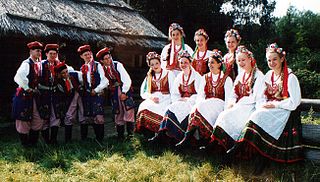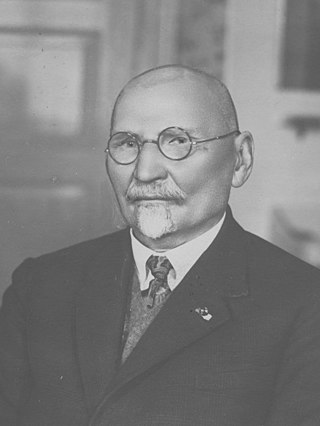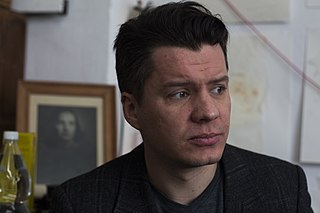Related Research Articles

Kraków, less often spelled Cracow in English, is the second-largest and one of the oldest cities in Poland. Situated on the Vistula River in Lesser Poland Voivodeship, the city dates back to the seventh century. Kraków was the official capital of Poland until 1596 and has traditionally been one of the leading centres of Polish academic, economic, cultural and artistic life. Cited as one of Europe's most beautiful cities, its Old Town with Wawel Royal Castle was declared a UNESCO World Heritage Site in 1978, one of the world's first sites granted the status.

Jan Alojzy Matejko was a Polish painter, a leading 19th-century exponent of history painting, known for depicting nodal events from Polish history. His works include large scale oil paintings such as Rejtan (1866), the Union of Lublin (1869), the Astronomer Copernicus, or Conversations with God (1873), or the Battle of Grunwald (1878).

Kraków is considered by many to be the cultural capital of Poland. It was named the European Capital of Culture by the European Union for the year 2000. The city has some of the best museums in the country and several famous theaters. It became the residence of two Polish Nobel laureates in literature: Wisława Szymborska and Czesław Miłosz, while a third Nobel laureate, the Yugoslav writer Ivo Andrić also lived and studied in Krakow. It is also home to one of the world's oldest universities, the Jagiellonian University of Kraków, and Jan Matejko Academy of Fine Arts, the oldest Polish fine art academy, established in 1818 and granted full autonomy in 1873.

Leon Jan Wyczółkowski was one of the leading painters of the Young Poland movement, as well as the principal representative of Polish Realism in art of the Interbellum. From 1895 to 1911 he served as professor of the Jan Matejko Academy of Fine Arts (ASP) in Kraków, and from 1934, ASP in Warsaw. He was a founding member of the Society of Polish Artists "Sztuka".

Jacek Malczewski was a Polish symbolist painter who is one of the most revered painters of Poland, associated with the patriotic Young Poland movement following a century of Partitions. He is regarded as the father of Polish Symbolism. His creative output combined the predominant style of his times with historical motifs of Polish martyrdom, the romantic ideals of independence, Christian and Greek mythology, folk tales, as well as his love of the natural world. He was the father of painter Rafał Malczewski.

The Jan Matejko Academy of Fine Arts in Kraków, is a public institution of higher education located in the centre of Kraków, Poland. It is the oldest Polish fine art academy, established in 1818 and granted full autonomy in 1873.

The Gallery of 19th-Century Polish Art at Sukiennice, is a division of the National Museum, Kraków, Poland. The Gallery is housed on the upper floor of the Renaissance Sukiennice Cloth Hall in the center of the Main Market Square in Old Town Kraków.

Jan Stanisławski was a Polish modernist painter, art educator, and founder and member of various innovative art groups and literary societies. In 1906 he became a full professor at the Academy of Fine Arts in Kraków.
Kerry James Marshall is an American artist and professor, known for his paintings of Black figures. He previously taught painting at the School of Art and Design at the University of Illinois at Chicago. In 2017, Marshall was included on the annual Time 100 list of the most influential people in the world. He was born and raised in Birmingham, Alabama, and moved in childhood to South Central Los Angeles. He has spent much of his career in Chicago, Illinois.
Włodzimierz Jacek Papla is a Polish graphic artist and painter, a director of the Institute of Fine Arts at the University of Zielona Góra.

Konstanty Laszczka was a Polish sculptor, painter, graphic artist, as well as professor and rector of the Jan Matejko Academy of Fine Arts in Kraków. Laszczka became the Rector of the Academy in 1911, however, for family reasons he resigned from this function in 1912.
Tomasz Jerzy Vetulani is a Polish painter, drawer and sculptor. Born and educated in Kraków, he moved to Utrecht in 1991, and he has been active there since, holding also a citizenship of the Netherlands. In his works, using among others silicone and sponge, he includes both personal references and comments on current political and social issues.

Jan Nepomucen Głowacki was a Polish realist painter of the Romantic era, regarded as the most outstanding landscape painter of the early 19th century in Poland under the foreign partitions. Głowacki studied painting at the Kraków School of Fine Arts and later at the academies of Prague and Vienna, as well as Rome and Munich. He returned to Kraków in 1828, and became a teacher of painting and drawing. From 1842 he served as a professor in the Faculty of Landscape Painting at the School of Fine Arts. His work can be found at the National Museum of Poland and its branches. Some of his work was looted by Nazi Germany in World War II and has never been recovered.

Leopold Loeffler, also spelled Löffler,, was a Polish realist painter of the late Romantic period popular in the second half of the 19th century under the foreign partitions of Poland. Lithographic reproductions of his paintings were widely distributed among the members of the Kraków and Warsaw art societies, and frequently reprinted in popular periodicals owing to their historical references to Polish national uprisings and battlefronts, as well as their great attention to period detail.

Jerzy Bereś was a Polish sculptor, author and performance artist.
Anna Sobol-Wejman is a Polish printmaker.

Bogumił Książek is a Polish painter.

Bogusław Bachorczyk is a Polish painter, draftsman and sculptor.

Jan Józef Wojnarski was a Polish painter, graphic artist and art professor.
Lech Polcyn is a Polish graphic artist, photographer and painter, professor at the Academy of Fine Arts in Kraków.
References
- ↑ Tomalski, Krzysztof, ed. (2014). Grafika ASP Krakow. Graphic Arts Academy of Fine Arts in Cracow. Archived from the original on 4 September 2021. Retrieved 10 October 2019– via Issuu.
- ↑ Fejkiel, Jan. "Grafika Sześciu". Jan Fejkiel Gallery (in Polish). Archived from the original on 25 May 2022. Retrieved 10 October 2019.
- ↑ "Untitled, 1995". National Gallery of Art . Archived from the original on 27 September 2022. Retrieved 10 October 2019.